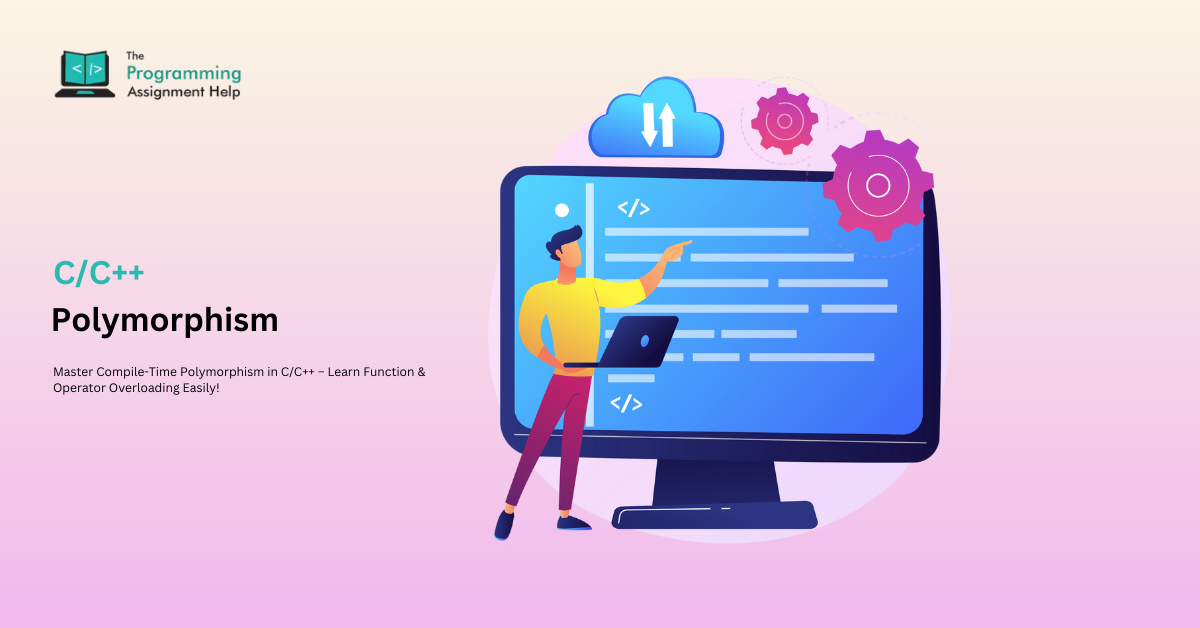
- 27th Aug 2025
- 15:17 pm
- Admin
C++ Polymorphism is one of the key concepts of Object-Oriented Programming (OOP). It allows functions and objects to behave differently according to the context and in which code can become more reusable, flexible and easier to maintain. The term polymorphism is derived as a combination of Greek words with the meaning polys, referring to the term many, and morph meaning forms. Two kinds of polymorphism that are widely utilized in C++ are Compile-Time Polymorphism or Run-Time Polymorphism.
Two kinds of polymorphism are supported by C++:
- Compile-Time Polymorphism
- Run-Time Polymorphism
1. Compile-Time Polymorphism (Static Binding)
Compile-time polymorphism is also known as early binding since a choice is made when an instance of function call is performed during compilation.
How is it implemented?
- Function Overloading – With the same function name utilizing various parameter lists.
- Operator Overloading – Defining the operator behavior for user-defined types.
Example: Function Overloading
#include <iostream>
using namespace std;
int add(int a, int b) {
return a + b;
}
double add(double a, double b) {
return a + b;
}
int main() {
cout << add(2, 3) << endl; // Calls int version
cout << add(2.5, 3.5) << endl; // Calls double version
return 0;
}
Example: Operator Overloading
#include <iostream>
using namespace std;
class Complex {
double real, imag;
public:
Complex(double r, double i) : real(r), imag(i) {}
Complex operator+(const Complex& other) const {
return Complex(real + other.real, imag + other.imag);
}
void display() const {
cout << "Real: " << real << ", Imaginary: " << imag << endl;
}
};
int main() {
Complex c1(2.0, 3.0), c2(1.5, 2.5);
Complex result = c1 + c2;
result.display();
return 0;
}
Benefit: Improves readability and makes the code expressive.
2. Run-Time Polymorphism (Dynamic Binding)
Late binding or run- time polymorphism, is the approach to settling which method to call when executing the program based on the general wide form of the object.
How is it implemented?
- Virtual Functions – Declared in the base classes, rewritten in the derived classes.
- Pointers or References to Base Class – Allow dynamic method calls.
Example: Virtual Functions
#include <iostream>
using namespace std;
class Shape {
public:
virtual void draw() const {
cout << "Drawing a shape." << endl;
}
};
class Circle : public Shape {
public:
void draw() const override {
cout << "Drawing a circle." << endl;
}
};
int main() {
Shape* shapePtr = new Circle();
shapePtr->draw(); // Calls Circle's draw()
delete shapePtr;
return 0;
}
Benefit: It enables it to be flexible in the sense of it being capable of dealing with complex hierarchies.
Key Differences Between Compile-Time and Run-Time Polymorphism
- Binding
- Compile-Time Polymorphism: Early binding (at compile-time)
- Run-Time Polymorphism: Late binding (at run-time)
- Techniques Used
- Compile-Time Polymorphism: Function overloading, Operator overloading
- Run-Time Polymorphism: Virtual functions
- Performance
- Compile-Time Polymorphism: Faster execution
- Run-Time Polymorphism: Slight overhead due to dynamic dispatch
Conclusion
Polymorphism in C++ enables the programs to be flexible, maintainable and scalable. There is also need to have a knowledge of both compile-time and run-time polymorphism so as to develop efficient code in the object-oriented concept.
 Getting into C++ polymorphism? Looking for step by step explanations and examples of polymorphism? Or need someone to help with your assignments? Try our C++ Assignment Help or C Programming Assignment Help pages. Our professionals are able to help you with the most difficult OOP issues.
Getting into C++ polymorphism? Looking for step by step explanations and examples of polymorphism? Or need someone to help with your assignments? Try our C++ Assignment Help or C Programming Assignment Help pages. Our professionals are able to help you with the most difficult OOP issues.








